- Home
- Leslie Meier
English Tea Murder Page 4
English Tea Murder Read online
Page 4
Turning on her side, she stared at the windows, which were lighter patches of gray in the darkened room. She remembered how nervous she’d been going through security at Logan Airport, even though she’d checked the TSA Web site and packed according to the directions, filling a quart-sized ziplock bag with miniature versions of her favorite toiletries. She’d forgotten the water bottle she had tucked in her travel bag and had been forced to empty it, but the officer had been pleasant about it. George Temple hadn’t been so lucky. The buzzer had sounded when he walked through the metal detector, and he’d actually been taken away by two officers, protesting loudly. “I never saw that before,” he was saying as they hustled him along.
What on earth had they found? wondered Lucy, now staring at the white glass light fixture that hung from the ceiling, dimly glowing from the reflected light that came through the windows from the street. And what did they do to him? She’d been warned that TSA officers were empowered to conduct strip searches, and she’d made sure not to wear an underwire bra and had chosen elastic-waist pants without a zipper, just to be on the safe side.
No wonder Temple had seemed flustered when he returned and began rounding up the group and making sure everyone was there. Of course, Will Barfield was late and his mother’s fretting had driven them all to distraction. “This isn’t like him,” she kept saying. “I hope he hasn’t had some sort of accident.”
By then Temple had begun coughing and sneezing and had used his inhaler at least once. Ann Smith had noticed and urged him to sit down and relax, taking deep regular breaths. He had complied and seemed to be recovering, until she tried to wrap him in her pashmina shawl so he’d be nice and warm. He’d protested and that had started a new fit of coughing.
Then the gate attendant had announced boarding and there was a great deal of movement, and Lucy lost track of Temple as she waited for her row number to be called. Dr. Cope had been right next to her at one point, she remembered, but if he noticed Temple’s condition, he hadn’t seemed concerned. Now that she thought about it, it seemed a bit odd. Temple’s coughing had been very noticeable, and he’d attracted a lot of attention. At one point, a uniformed airline representative had even approached him, but Temple had produced his inhaler and apparently assured the official that he would be all right.
Of course, thought Lucy, embarrassment had no doubt played a part in Temple’s refusal to accept assistance. She knew how silly she’d felt that afternoon, when she nearly fainted at the Portobello Market. The last thing she’d wanted was to make a scene.
Sighing, Lucy checked her watch. Three in the morning. Hours to go before it was time to get up. She should have accepted Sue’s offer of a sleeping pill. Sue, who’d taken two, was sound asleep while Lucy was tossing and turning and burping up chicken korma. She rolled over, closed her eyes, and suddenly remembered Sue telling her the pills were on the sink in case she changed her mind. She had indeed changed her mind, she decided, throwing back the covers.
Chapter Four
When Lucy and Sue descended six flights of stairs to the little hotel’s basement breakfast room on Sunday morning, they found that everyone from the group was already there, as were a smattering of other guests, sitting in twos and threes at little tables covered with red and white checked cloths. They nodded and smiled as they wound their way through the dining room to the table for four where Pam and Rachel were waiting for them. As soon as they sat down, a young waitress arrived with pots of coffee and tea, and they both chose coffee, craving the caffeine. While they were drinking, Pam stood up and tapped her juice glass with a spoon.
“I have an announcement,” she began in an official tone. “I received an e-mail from President Chapman this morning, and she sends her condolences to all of us. She was also able to find a substitute for George Temple—she is sending Professor Quentin Rea to take over the tour.”
The name caught Lucy by surprise, and her empty cup rolled onto its side with a rattle as she set it on the saucer. She had taken a class in Victorian literature from Professor Rea some years ago and had found him terribly attractive. Of course, he was much younger then—they both were—but she’d always been a sucker for that preppy look of worn tweed jackets, frayed button-down shirts, and sun-streaked hair. She wondered if she’d still be attracted to him, not that she planned to do anything about it, she vowed, straightening the cup.
She hadn’t done anything then, but she had been tempted, and she was sure that he had also found her attractive and smiled at the memory.
“Lucy! Stop daydreaming!” It was Sue, hissing at her. “Our server wants to know if you want cereal.”
Lucy blushed and turned to the girl who offered bran flakes, corn flakes, or Cheerios. Cheerios, here in England. Who knew? But Lucy chose bran flakes, taking the state of her digestion into account.
Pam was continuing her speech to the group. “Professor Rea won’t arrive until tomorrow morning, so Dr. Chapman suggests we follow the itinerary George planned on our own. That means we go to the Tower of London this morning, break for lunch, and visit St. Paul’s Cathedral in the afternoon. I suggest those who are interested gather in front of the hotel at nine-thirty and we’ll go together on the Tube.”
Pam was seating herself when the server arrived with Lucy’s bowl of cereal. “This morning’s breakfast is egg, bacon, and beans,” said the girl.
“Okay,” said Lucy, figuring that she might as well try the traditional English breakfast. Pam and Rachel declined the beans and Sue opted for nothing but toast.
The Smith family was seated at the table next to Pam, and Ann reached across and tapped her on the arm. “Since it’s Sunday, I think we’ll opt out of visiting the Tower,” she said. She had dark circles under her eyes, and the gray sweater she was wearing only added to her careworn appearance. “We’ll attend services at St. Martin in the Fields and then go on to the National Gallery.” She paused. “Caroline loves art.”
Lucy glanced at the red-haired girl, who seemed more interested in using a triangle of toast to mop up the egg and bean juice that remained on her plate than in discussing the day’s program.
Her father, Tom, stabbed the map spread open before him on the table with a stubby finger. “We can take the Northern Line from Goodge Street. It’s just a few stops. Ann doesn’t feel up to much today, what with this jet lag and all.”
Lucy thought he seemed a practical, take-charge sort of guy, rather like Bill, and she suddenly missed her husband.
“Fine with me,” said Pam as their breakfasts arrived. She poked her fork at the generous slices of pink meat that were arranged alongside her fried egg. “This doesn’t look like bacon.”
“English bacon’s different,” said Sue, looking as if she wouldn’t touch it with a ten-foot pole. As far as Lucy knew, Sue rarely ate solid food and seemed to exist on little more than black coffee and cocktails.
Rachel wasn’t so fussy; she was digging right in. “It’s very good.”
Lucy tasted a forkful of beans and found them not so good. “Live and learn,” she said with a grimace. In the future, she decided, she’d skip the beans.
“Don’t like the beans?” It was Will Barfield, who was seated with his mother on the other side of their table, next to the wall. “I’ll take them.”
“Will!” protested Laura. She was dressed today in the same ladylike caramel-colored leather jacket she’d worn on the plane but had added a different scarf, green this time. “Don’t be rude!”
“He’s not rude,” laughed Lucy, thinking of her son, Toby, and the huge amounts he ate as a teenager. “He’s still growing.” She spooned her beans onto her bread plate and passed it over. “It’s a shame to waste them, and I’m certainly not going to eat them.”
“Thanks,” said Will, diving in. “You know, I’m not all that interested in this historical stuff,” he said, raising a fork dripping with juicy beans and popping it into his mouth. “I heard the London Eye is really cool. I think I’d like to do that.”
“Fine with me,” said Pam.
“But, Will,” protested his mother, slipping a pair of schoolmarmish wire-rimmed reading glasses on her nose and preparing to consult her guidebook. “You can’t come to London and miss the Bloody Tower. I think you’d really like it—they say it has suits of armor worn by Henry the Eighth.”
Will had plucked a tiny jar of marmalade from the little silver rack and was slathering it onto a triangle of toast. “Nah. I wanna do the Eye and then maybe hike over to the Tate Modern and that Millennium Bridge over the river. I saw it in a movie—it was neat.”
Laura was studying the map in her guidebook. “Maybe you’re right. The Millennium Bridge is next to the New Globe Theatre. I’d love to see that. It’s a copy of Shakespeare’s theater. Maybe we could even see a play there.”
Will’s face stiffened. “It’s a pretty long walk, Mom.” Lucy and her friends exchanged glances. It was clear to them that Will was trying to get away from his mother for the day. “Probably too much for you,” he added.
“I walk all the time,” she said, squashing his rebellion with a look as she removed her glasses and tucked them into a quilted case. “I walk miles every week with the dog.”
“Okay,” he said, accepting defeat with a sigh and pushing his chair back. “Let’s go.”
Laura popped happily to her feet. “Have a nice day,” she said to the group in general before following her tall son out of the room.
Lucy watched them go, spreading a dab of butter on her toast and wondering how this little struggle would play out. It was only the second day of the trip and Will was already chafing at his mother’s attempts to control him. He was obviously a kid who enjoyed his independence, and it seemed odd that he’d agreed to a trip with his mother. Most boys his age would choose to spend spring break in Mexico or Florida, or in a worst-case scenario, at home, where they had developed ways of deluding and eluding their parents and could hang out with their high school friends.
“He’s a cute kid,” said Rachel. “Reminds me of my Richie.”
“Have you heard from Richie lately?” asked Lucy, who knew that Rachel’s son was in Greece, working on an archaeological dig.
“Come to think of it, not since last month.” She laughed. “He wanted income tax forms.”
“That’s something at least,” complained Pam. “I haven’t heard a word from Tim since Christmas.” She paused. “Lucy’s so lucky to have Toby living in town.”
“It’s true. I am lucky.” Lucy put down her fork and dabbed at her mouth with her napkin. “But I have to remind myself not to hover. They may be nearby, but they need their own space.” It was a lesson she thought Laura Barfield would have to learn, too, if she hoped to maintain a healthy relationship with her son.
Dr. Cope and Jennifer Fain were already waiting on the sidewalk in front of the hotel when Lucy and her friends stepped outside at nine-thirty. The sky was overcast but the TV weatherman had promised later clearing, and the temperature was forecast to rise to twelve degrees Celsius—around sixty degrees Fahrenheit.
“Are we all here?” asked Pam, consulting her list.
“Autumn’s still upstairs,” said Jennifer.
“We’ll wait for her, then,” said Pam, unfolding her map of the Underground. “It looks like we can take the Northern Line from Euston Square.”
“Lead on,” said Lucy when the door of the hotel opened and Autumn clumped down the steps in her Dr. Martens. Today she was wearing black leggings that stopped at her ankles, a short black jersey dress, and a torn fishnet sweater.
“Do you think you’ll be warm enough?” asked Pam, unable to stifle her motherly instincts.
Autumn’s back stiffened and she glared at Pam as if she’d been accused of some dastardly crime. “I’ll be fine.”
“Okay,” said Pam, backing off. “It looks like we’re all here. The others have made separate plans.”
“Well, this is nice,” declared Dr. Cope. “I feel like Henry the Eighth, accompanied by six lovely ladies.”
“Just as long as you treat us better than he treated his wives,” said Rachel, falling into step beside him as they walked along Gower Street to the Tube station.
Crowds were already making their way to the Tower of London when they emerged from the Tower Hill Tube station into what had become a sunny day. As they joined the throng walking along the outer walls that ringed the spacious grassy moat, Lucy thought it must have been much the same throughout the centuries, especially when traitors and criminals were publicly executed on Tower Hill. Today’s crowds weren’t out for blood, however, but were drawn by the Tower’s various attractions, including the crown jewels.
Despite the sunshine, it was chilly when they passed through the Middle Tower entrance into the castle complex. Lucy wasn’t sure what she had expected but was somewhat surprised to find the Tower of London wasn’t a single structure; rather, it was a number of buildings collected inside a double ring of walls that would frustrate an attacker. It was a true medieval fortress and reminded her of books about knights and castles she had read to Toby when he was small. Even today, she thought as they strolled along the shadowed path between the two walls, there was something grim about the place.
“The Traitor’s Gate,” said Dr. Cope, pausing in front of a semicircular opening in the outer wall, blocked with forbidding bars, that connected to the Thames beyond. It was here that prisoners had been delivered by boat.
“Imagine being brought through there, knowing you’d never get out,” said Rachel.
“They used to put the heads of people they executed on top of the walls,” continued Dr. Cope. “A grim reminder of the price of treason.” He lifted his shoulders in a shrug. “And in those days, treason was whatever displeased the king.”
“This is a terrible, evil place,” said Jennifer, drawing the lapels of her pale blue jacket together with a delicate, ringed hand.
“Not really,” said Rachel, who was studying her guidebook. “It says here it’s like a little village. People actually live here. The Yeoman Warders—those are the guys in the funny red outfits—live here with their families.”
“That’s too cool,” said Autumn, breaking her usual bored attitude to express a flicker of interest. “Look at that bird!” She was pointing to a super-sized crow, perched above the entry gate.
With its feathers fluffed out, it reminded Lucy of Autumn’s spiky black hairdo and she smiled.
“That,” said Rachel, “is a raven. The legend is that if the ravens ever leave the Tower, the kingdom will fall.”
“I’d be worried if I were Prince Charles,” said Sue.
Rachel smiled. “They’re taking no chances—their wings are clipped.”
“Seems like cheating to me,” observed Lucy as they passed through yet another dank and chilly portal to emerge into a spacious green, grassy court. The gleaming White Tower, a large square fortress with a domed and turreted tower at each corner stood before them.
“It was built by William the Conqueror,” said Rachel, amazed.
Lucy didn’t know many dates but she did know this one. “In something like 1066?”
“Yeah. That’s old,” said Pam.
“The Hallett House, the oldest building in Tinker’s Cove, was built in the eighteenth century,” said Sue. “That White Tower is nearly a thousand years old.”
“This is really something,” said Rachel. “So where shall we start?”
Sue didn’t hesitate. “The jewels, silly. Where else?”
A short line was already forming at the building housing the crown jewels, but the group happily joined it. Once inside, they discovered it was a bit like Disney World with a convoluted route that hid the length of the wait. The queue snaked past a flickering old black-and-white newsreel of Queen Elizabeth II’s coronation, where she was decked out in a crown and ermine robe, as well as a number of other jewels, and carried an orb and scepter. Eventually they found themselves in a darkened room where a moving pathway carried viewers past the il
luminated glass cases containing crowns and scepters glittering with thousands of diamonds, pearls, sapphires, emeralds, and rubies.
It all left Lucy rather cold, except for Queen Victoria’s dainty little diamond topper, which looked like a miniature crown designed for a doll, but Sue was enthralled. When she came to the end of the people mover, she quickly ducked around and hopped on for another viewing.
“Pardon me,” she said to the startled gentleman she stepped in front of.
“Not at all,” he replied with famous British politeness.
But when she tried the same trick a second time, one of the Yeoman Warders stepped forward. “Madam, if you wish to see the jewels again, you will have to go to the end of the queue.”
“Busted,” announced Autumn, who was waiting with Lucy at the end.
“I don’t care. It was worth it,” insisted Sue. “If diamonds are a girl’s best friend, the queen sure has a lot of friends.”
Dr. Cope and Jennifer had drifted away from the others and were standing by a plaque embedded in the pavement, near a small stone church building, gazing at a withered bunch of roses that had been placed there. Lucy and the others went over to join them, and she realized the plaque marked the spot where the scaffold used for royal executions had once stood.
“Only very important prisoners were executed here,” Dr. Cope was saying. “Or more controversial ones. It was more private since the public wasn’t allowed in.”
Lucy was reading the names embedded in a circle around the plaque: “Margaret Pole—Lady Salisbury; Catherine Howard; Anne Boleyn; Lady Jane Grey—”
“That poor girl was only seventeen . . . ,” said Rachel, who devoured historical novels.
“Whatever did she do?” asked Jennifer.
“Nothing really,” said Rachel. “She was the victim of an ambitious family. They managed to get her on the throne, but in the end they lost a battle and somebody else got the job—Mary Tudor, fondly known as Bloody Mary.”

 Christmas Card Murder
Christmas Card Murder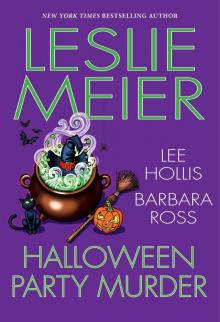 Halloween Party Murder
Halloween Party Murder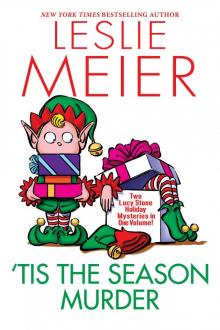 'Tis the Season Murder
'Tis the Season Murder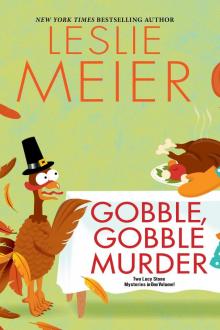 Gobble, Gobble Murder
Gobble, Gobble Murder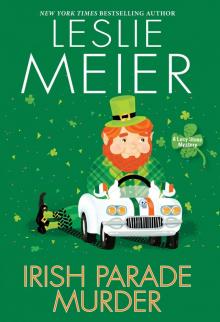 Irish Parade Murder
Irish Parade Murder Bake Sale Murder
Bake Sale Murder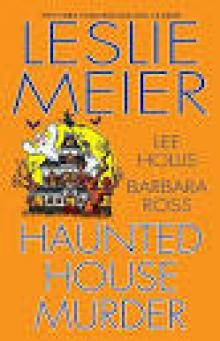 Haunted House Murder
Haunted House Murder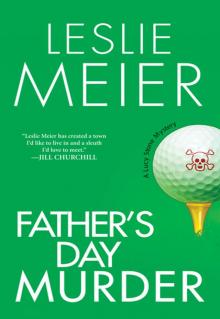 Father’s Day Murder
Father’s Day Murder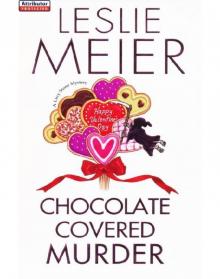 Chocolate Covered Murder
Chocolate Covered Murder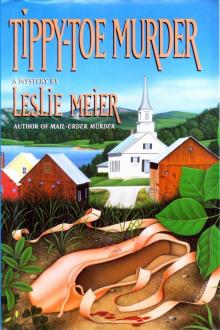 Tippy Toe Murder
Tippy Toe Murder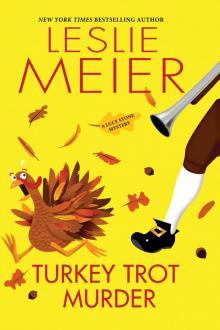 Turkey Trot Murder
Turkey Trot Murder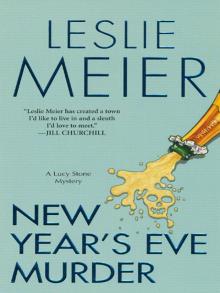 New Year's Eve Murder
New Year's Eve Murder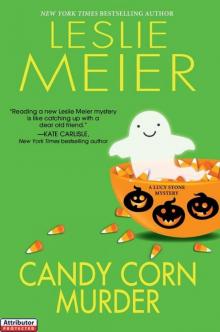 Candy Corn Murder
Candy Corn Murder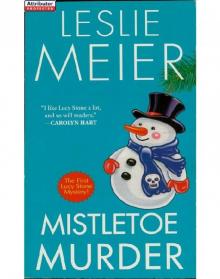 Mistletoe Murder
Mistletoe Murder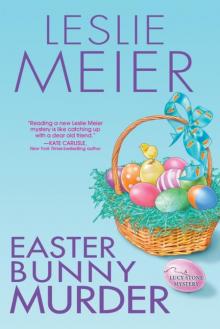 LStone 20 - Easter Bunny Murder
LStone 20 - Easter Bunny Murder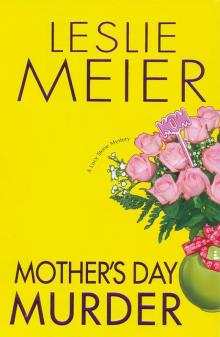 Mother's Day Murder
Mother's Day Murder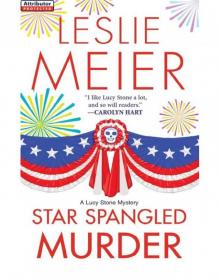 Star Spangled Murder
Star Spangled Murder Silver Anniversary Murder
Silver Anniversary Murder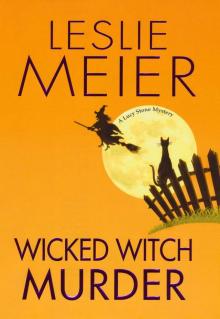 Wicked Witch Murder
Wicked Witch Murder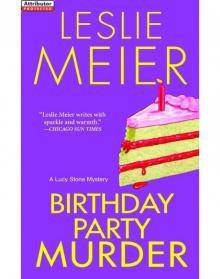 Birthday Party Murder
Birthday Party Murder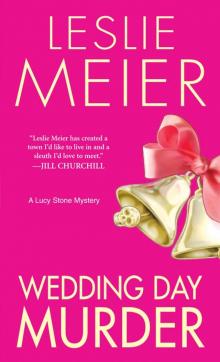 Wedding Day Murder
Wedding Day Murder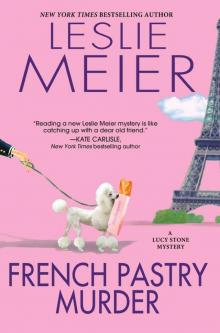 French Pastry Murder
French Pastry Murder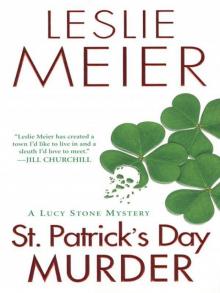 St. Patrick's Day Murder
St. Patrick's Day Murder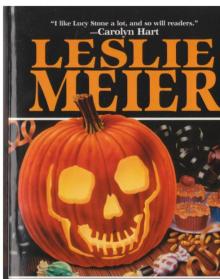 Trick or Treat Murder
Trick or Treat Murder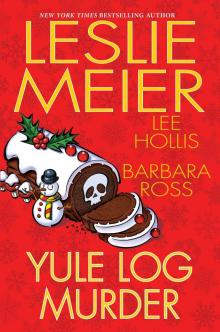 Yule Log Murder
Yule Log Murder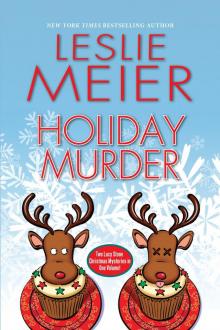 Holiday Murder
Holiday Murder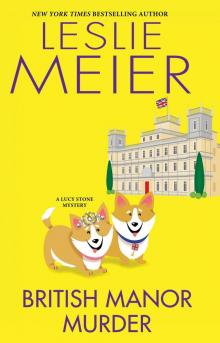 British Manor Murder
British Manor Murder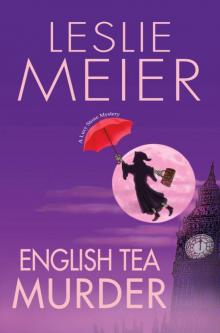 English Tea Murder
English Tea Murder